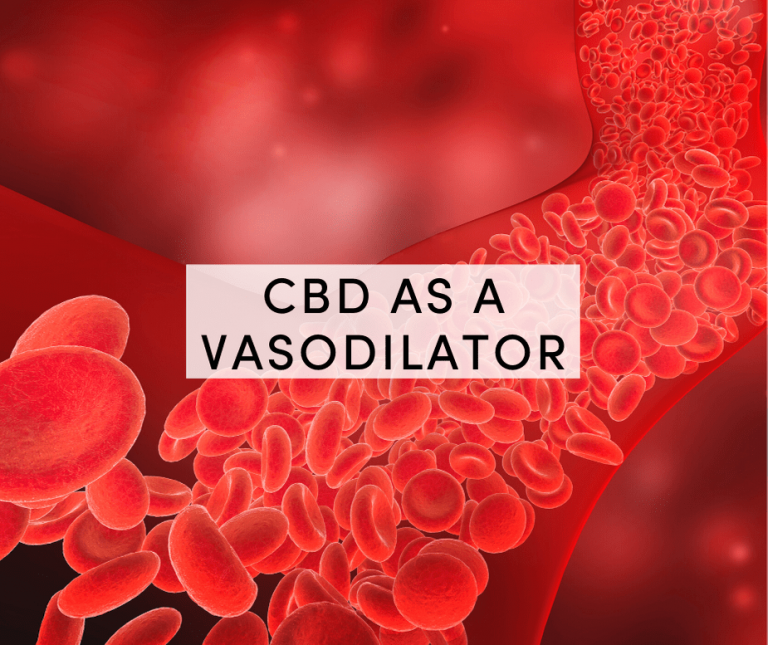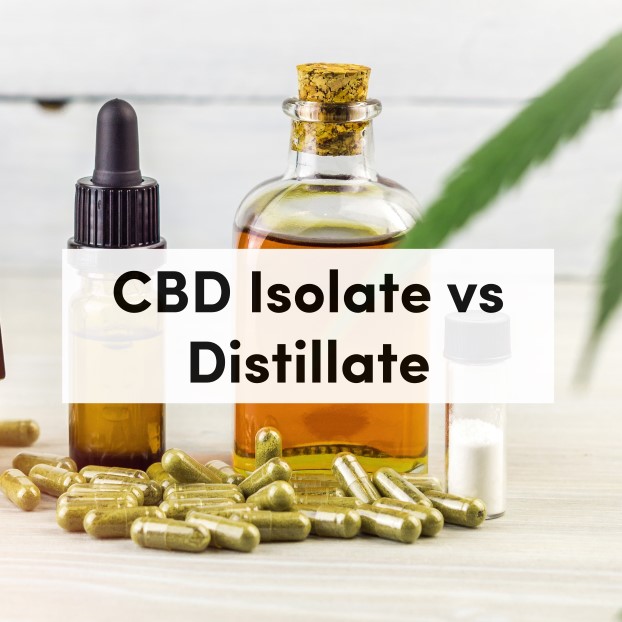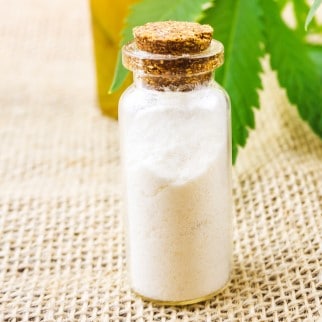CBD As a Vasodilator: Can it Improve Your Blood Flow?

Posted on March 14th, 2021
As cannabis products rise in popularity, most people hope that these natural compounds can serve as alternatives to pharmaceuticals with substantial side effects. After all, according to studies, CBD has numerous potential benefits. Some of these include the ability to relieve symptoms of stress, anxiety, depression, inflammation, and cardiovascular conditions. Recent research shows that you can use CBD as a vasodilator. If this is true, how does it work to achieve that, and is it better than other vasodilators? Let us delve further.
What’s a Vasodilator?
A vasodilator is simply any substance that causes vasodilation. Vasodilation is the widening of the blood vessels to improve blood flow throughout the body. Vasodilation happens naturally in the body at various times. However, vasodilators are also an important part of modern medicine.
For instance, they can be used to treat high blood pressure or hypertension. When the blood vessels expand, hypertension reduces. CBD as a vasodilator naturally interacts with the body’s receptors in order to cause vasodilation.
What is CBD?
Cannabidiol is a non-psychotropic cannabinoid. It is a phytocannabinoid, meaning it exists in plants; most prevalently in cannabis.
Commercial cannabidiol comes from the industrial hemp plant. It is typically mixed with a carrier oil like MCT or hemp. Unlike CBD from marijuana plants, hemp CBD doesn’t contain high levels of THC (tetrahydrocannabinol). This means it doesn’t have the intoxicating effects that come with marijuana or weed. Instead, users report feeling calm and relaxed, among other positive effects.
According to federal law, legal cannabidiol should have no more than 0.3% THC. Given that hemp has meager amounts of THC, CBD products from this kind of cannabis plant don’t have intoxicating effects. On the contrary, if the CBD comes from marijuana and has too much THC in it, it is federally illegal. That’s why it’s only available in regions with legal medical or recreational marijuana.
Although CBD comes in a wide array of forms, like powders, vape juice, capsules, edibles, topical patches, and creams, it is popularly used as a sublingual oil/tincture. This entails placing a few drops of the product under the tongue and letting it sit for at least 30 seconds.
According to pharmacology research, CBD offers a wide range of potential benefits. Some use it to address conditions such as arthritis, chronic pain, inflammation, epilepsy, Parkinson’s disease, and multiple sclerosis. It’s also common among individuals suffering from an array of mental conditions. According to studies, cannabidiol can be effective in addressing social anxiety disorder, post-traumatic stress disorder (PTSD), anxiety-related insomnia, and generalized anxiety disorder.
In addition, emerging evidence shows that CBD as a vasodilator can use the same mechanism to address hypertension as it does to alleviate anxiety.
CBD & The Endocannabinoid System
The endocannabinoid system or ECS is a complex biological system present in mammals. It enables cannabinoids to send and receive messages that regulate most of the body’s vital operations. The ECS has two primary endocannabinoid receptors, CB1 and CB2. Cannabinoids bind directly to these receptors, affecting regions in the brain that affect pain and manage inflammation among other functions. THC binds/interacts with the CB1 receptors causing the typical side effects of marijuana.
Cannabidiol, however, doesn’t directly bind to these receptors, but an array of indirect actions that end up causing therapeutic benefits. This includes activating TRPV1 receptors that are responsible for body temperature, pain, and inflammation regulation.
 CBD As a Vasodilator
CBD As a Vasodilator
It is hard for researchers to give a specific reason as to why cannabinoids like CBD act as vasodilators. However, as with most of their effects, they believe it is tied to the endocannabinoid system.
Consider the interaction of cannabinoids and the ECS in pain management as an example. You consume the substance and the body starts to process the compound. During the process, the substance interacts with ECS receptors throughout the body to regulate reactions like chronic pain.
Benefits of CBD As a Vasodilator
Due to the limited research on this subject, researchers are only aware of a few specific instances where CBD vasodilation may alleviate symptoms of certain conditions. Some of the conditions that respond well to vasodilation are:
- High Blood Pressure (Hypertension)
As the name implies, high blood pressure entails an increased demand on the heart and arteries throughout the body. Many patients use medical marijuana or CBD to complement their treatment plan, which includes exercise and a good diet.
- Glaucoma
Pressure is one of the primary side effects of glaucoma. As a result of poor fluid drainage, eye pressure increases, damaging the optic nerve which results in blindness. With a doctor’s guidance, supportive lifestyle changes and the natural vasodilation of CBD, intraocular pressure may return to a manageable level. If your doctor supports using this supplement, this form of vasodilation doesn’t come with the side effects of traditional prescription drugs.
- Nail-Patella Syndrome
Glaucoma is one of the nail-patella syndrome symptoms. By incorporating CBD into your daily routine, you may be able to reduce blood pressure in a natural manner. This could then offset and help you manage intraocular pressure. Given CBD can be helpful with an array of other nail-patella syndrome symptoms such as chronic pain, it offers a multi-faceted option for potential relief.
With more studies, researchers are bound to discover more beneficial uses of CBD as a vasodilator.
Pharmaceuticals vs CBD as a Vasodilator
Incorporating cannabidiol into your routine for its role in vasodilation provides an array of benefits compared to pharmaceutical vasodilators including:
-may alleviate multiple symptoms
-natural compound
-Fewer and less severe side effects
According to this medical website, side effects of commonly prescribed vasodilators include headaches, edema, impotence, kidney failure, cough, and palpitations. Compare that to side effects of CBD, which are limited to occasional fatigue and diarrhea. There is almost no chance of reaching a toxic dose of CBD. The compound works to achieve homeostasis by more complex interactions and communication than specific pharmaceutical options. That being said, there is not enough evidence for the medical community to agree upon yet. Therefore, please consult your doctor before replacing any of your blood pressure medications with CBD.
Choosing CBD As a Vasodilator
You don’t need documentation or a prescription for CBD products. The one exception is Epidiolex, which is a CBD-derived medicine available to patients with epilepsy.
Keep in mind that because the FDA does not regulate CBD, product quality varies widely. High quality companies like Tanasi provide clear labeling with ingredients and dosage recommendations etc. Third party testing is also a good sign of a trustworthy producer. Naturally, with higher quality products come higher prices. But for the myriad of uses CBD offers, you’ll want to get the highest quality available.
Keep in mind that some CBD delivery methods work more slowly compared to others. For example, edibles and capsules need to go through the digestive system before becoming available to the body. Sublingual use or vaping, on the other hand, provide faster effects, as CBD is quickly absorbed by the tissues in the lungs or sublingual glands.
 Types of CBD Products
Types of CBD Products
When purchasing CBD products, you will have three types to pick from:
- Full-Spectrum
This is the most effective type of CBD. That’s because it contains all of the hemp plant’s organic flavonoids and terpenes as well as all other cannabinoids, including THC traces. All these compounds work together to provide an entourage effect, which essentially boosts the performance of CBD.
- Broad-Spectrum
This type has a slightly lower entourage effect as THC is removed from the product before it’s processed and sold.
- Isolate
Also referred to as CBD concentrate, isolate goes an extra step to remove all hemp components except CBD. This leaves just pure cannabidiol in the final product. Some users think pure CBD is the best, but the reason Isolates exist is to get rid of any chances of being tested positive on a THC test. In reality, full-spectrum CBD provides the best results.






